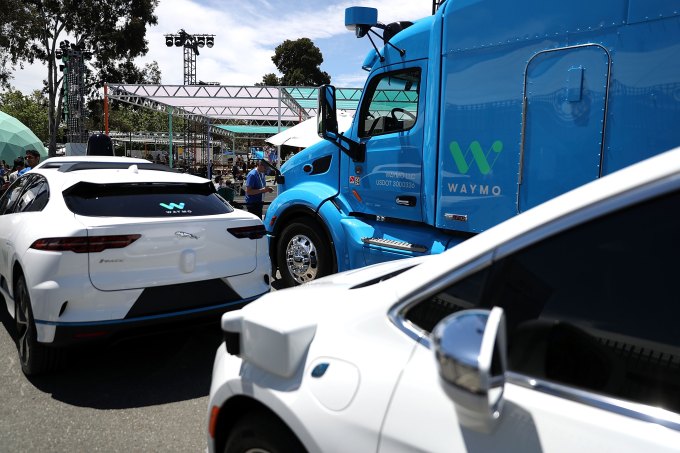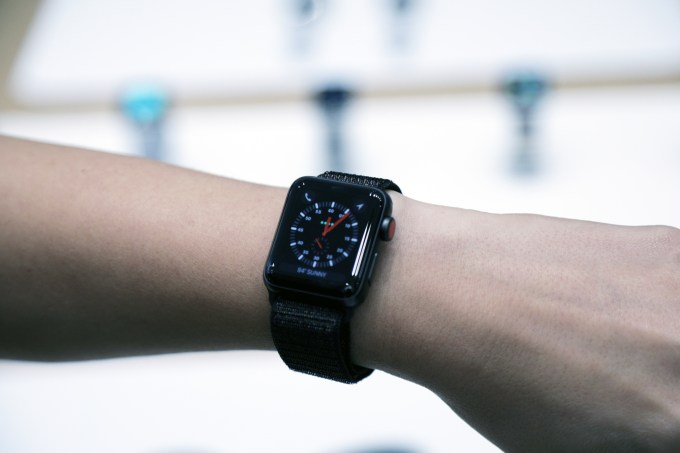Hello, weekend readers. This is Week-in-Review where I give a heavy amount of analysis and/or rambling thoughts on one story while scouring the rest of the hundreds of stories that emerged on TechCrunch this week to surface my favorites for your reading pleasure.
Last week, I talked about how Alexa wasn’t forgetting what you requested because that data was more valuable than one might think.

Photo by Justin Sullivan/Getty Images
The big story
In thinking about what to highlight in this week’s newsletter, I was tempted to talk about Zoom and Apple and Superhuman and the idea that secure communications can get screwed up when consent is bypassed, and I’m sure that’s something I’ll dig more into down the road, but what intrigued me most this week was single factoid from Google’s self-driving unit.
Waymo’s CTO told TechCrunch this week that the company has logged 10 billion miles of autonomous driving in simulation. That means that while you might have seen a physical Waymo vehicle driving past you, the real ground work has been laid in digital spaces that are governed by the laws of game engines.
The idea of simulation-training is hardly new, it’s how we’re building plenty of computer vision-navigated machines right now, hell, plenty of self-driving projects have been built leveraging systems like the traffic patterns in games like Grand Theft Auto. These billions of logged miles are just another type of training data but they’re also a pretty clear presentation of where self-supervised learning systems could theoretically move, creating the boundaries for a model while letting the system adjust its own rules of operation.
“I think what makes it a good simulator, and what makes it powerful is two things,” Waymo’s CTO Dmitri Dolgov told us. “One [is] fidelity. And by fidelity, I mean, not how good it looks. It’s how well it behaves, and how representative it is of what you will encounter in the real world. And then second is scale.”
Robotics and AV efforts are going to rely more and more on learning the rules of how the laws of the universe operate but those advances are going to be accompanied by other startups’ desires to build more high visual fidelity understanding of the world
There are plenty of pressures to create copies of Earth. Apple is building more detailed maps with sensor-laden vehicles, AR startups like are actively 3D-mapping cities using crowd-sourced data and game engine companies like Unity and Epic Games are building engines that replicate nature’s laws in digital spaces.
This is all to say that we’re racing to recreate our spatial world digitally, but we might just be scratching the surface of the relationship between AI and 3D worlds.
Send me feedback
on Twitter @lucasmtny or email
lucas@techcrunch.com
On to the rest of the week’s news.

(Photo: by Chip Somodevilla/Getty Images)
Trends of the week
Here are a few big news items from big companies, with green links to all the sweet, sweet added context.
- Trump must unblock his Twitter critics
Twitter is a consumer product, so politicians using it might feel like its their own personal account, but when they use it for political announcements it becomes an official communications channel and using features like blocking stifles national free speech. So says an NY-based appeals court this week of President Trump’s habit of blocking critics. It’s undoubtedly a ruling that’s going to have far-reaching implications for U.S. political figures that use social media. Read more here. - Nintendo switches up the Switch
The Nintendo Switch arrived on the scene with the bizarre notoriety of being a handheld system that was also a home console, but it’s not enough for the Japanese game co to capture the hybrid market, it’s looking to revisit the success it had back in the peak Nintendo DS days. The company announced the Switch Lite this week, which strips away a number of features for the sake of making a smaller, simpler version of the Nintendo Switch which is handheld-only and sports a longer battery life. Read more here. - Google and Amazon bury the home-streaming hatchet
At long last, one of the stranger passive aggressive fights in the smart home has come to a close. Amazon’s Prime Video is finally available on Google’s Chromecast and YouTube is now on Fire TV after a years-long turf war between the two platforms. Read more here. - AT&T maxes out its HBO ambitions
When AT&T bought HBO, via its Time Warner acquisition, execs made clear that they had acquired a premium product and planned to shift its standing in the market. The company announced this week that it will be launching a new service called HBO Max next year that will bring in new content including “Friends.” Read more here.

GAFA Gaffes
How did the top tech companies screw up this week? This clearly needs its own section, in order of badness:
- Apple nips a security nightmare in the bud:
[Apple disables Walkie Talkie app due to vulnerability] - Amazon warehouse workers plan strike:
[Amazon warehouse workers in Minnesota plan to strike on Prime Day over labor practices]

Extra Crunch
Our premium subscription service had another great week of deep dives. My colleague Zack Whittaker revisited the WannaCry ransomware that hit in 2017 with a lengthy profile and interviews with the researchers that stopped the malware dead in its tracks. After you dig into that profile, you can check out his Extra Crunch piece that digs further into how security execs and startups can learn from the saga.
What CISOs need to learn from WannaCry
“…There is a good chance that your networks are infected with WannaCry — even if your systems haven’t yet been encrypted. Hankins told TechCrunch that there were 60 million attempted “detonations” of the WannaCry ransomware in June alone. So long as there’s a connection between the infected device and the kill switch domain, affected computers will not be encrypted….”
Here are some of our other top reads this week for premium subscribers. This week, we talked a bit about the future of car ownership and “innovation banking.”
- The future of car ownership: cars-as-a-service
- Grasshopper’s Judith Erwin leaps into innovation banking
- How Roblox avoided the gaming graveyard and grew into a $2.5 billion company
Want more TechCrunch newsletters? Sign up here.
from TechCrunch https://ift.tt/2jNbon2



No comments:
Post a Comment